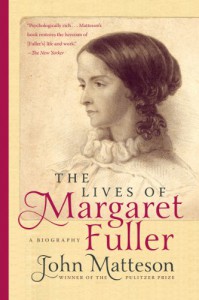How can you describe a Force? How can you write the life of Margaret?

Of late, and for too long, the Muse has left me and I have found little inspiration to write extensive reviews of the books I've been reading. But as I've given this one four stars, I'd be remiss if I entirely neglected to explain why.
I first became aware of Margaret Fuller's existence from a review in the New York Review of Books of one of the recent biographies that have come out and was intrigued (whether this one or Megan Marshall's, I forget). And when I came across this quote (which graces my e-mail address), I knew I had to know more: "I now know all the people worth knowing in America and I find no intellect comparable to my own."
It turns out that my gut reaction was correct: Fuller is a person worth knowing. I've provided some examples of her thoughts and beliefs in my status updates on GoodReads so I will only quote here a sketch culled from Matteson's biography:
Margaret Fuller was, in her time, the best-read woman in America and the one most renowned for her intelligence. She was the leading female figure in the New England movement known as transcendentalism. She edited the first avant-garde intellectual magazine in America. She was the first regular foreign correspondent, male or female, for an American newspaper. As a literary critic, she was rivaled in her era only by Edgar Allan Poe. Three years before the convention that is usually regarded as the beginning of the women's rights movement in the United States, she wrote a groundbreaking book demanding legal equality for women....
Though always formidable as a thinker, she became great only as she came to sympathize with the hopelessness of imprisoned prostitutes, the hunger of exploited children, and the pain of wounded soldiers who had offered everything they had for freedom.... It is only when we discover her as a misfit, as an apostle, as a seeker of Utopia, and in all the other identities through which she passed that she ceases to be the Margaret-ghost and lives for us once more....
Fuller's dearest principles [were] a sincere antipathy to violence and cruelty; a belief in the power of art and literature to assist in social change; and, above all, a confidence that the best, most durable revolution begins with the liberal education of every human being. (pp. xi, 444-5)
This does little justice to the person described in this work and Marshall's but, hopefully, it may inspire someone reading this to seek Fuller out.
 1
1


